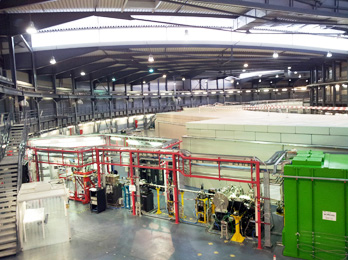The ALBA synchrotron facility near Barcelona, Spain, has commenced operations as a research tool wherein the BOREAS line amongst the existing seven beamlines has been allocated for use in the first experiment to be conducted at the facility.

The aim of the experiments, which are being carried out between June 6 and 10, is to observe the magnetic characteristics of nanoparticles of interest for enhancement of their superconductor properties.
Researchers Josep Ros and Eduardo Solano from the Universitat Autonoma de Barcelona along with researchers Susagna Ricart, Teresa Puig and Jaume Gàzquez from the Superconductors Group, Institute of Materials Science of Barcelona (ICMAB-CSIC) are carrying out the experiments using X-ray spectroscopy to study the nanostructure of the multi-layers of the ceramic superconductor material, YBa2Cu3O7, which is infused with metal oxide nanoparticles. Liquid nitrogen can be used to cool down the material to retain its superconductor properties and to facilitate transfer of electricity with very minimal energy loss in comparison to typical electric cables. The nanoparticles improve the superconductivity of the material providing an adhesive property to the magnetic vortices in the material. The researchers intend to use the synchrotron light to study the magnetic characteristics of nanoparticles of ferrite varieties and the impact they have on adhesive properties of the vortices. This will help in developing improved electrical transmission systems.
The ALBA accelerator which is funded by the Spanish and Catalan governments received 203 proposals for experiments to be conducted using the seven beamlines, each of which comprises a different experimental technique. Fifty proposals where accepted. Electrons travel at near-light velocities through the beamlines at 3GeV energy levels that generate electromagnetic radiation which can be employed to view atomic and molecular samples to study the structure of materials. The beamlines specializing in materials science and protein crystallography are the popular ones based on the number of proposals received. The BOREAS beamline has received the request for highest number of access hours.
Source: http://www.uab.es/